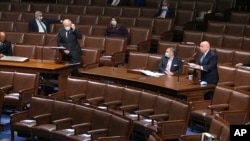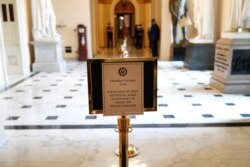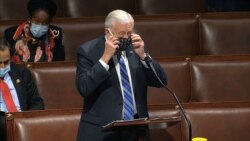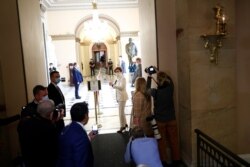The U.S. House of Representatives passed $484 billion in additional funding for small businesses and hospitals Thursday, a stopgap effort to add more money to the largest relief package in U.S. history. Lawmakers have now passed four measures worth trillions of dollars in a six-week period to address the economic and public health crises caused by the coronavirus outbreak.
The vote, 388-5-1, marked the first time the entire House had returned to Washington since mid-March, when stay-at-home orders preventing the spread of the coronavirus began to take effect. Voting stretched over several hours as lawmakers recorded their responses in small groups, with pauses every 30 minutes while the House chamber was cleaned.
The measure will now head to President Donald Trump to be signed into law.
The majority of the additional funding passed Thursday will be targeted at small businesses that missed out on an earlier pool of rescue money. Congressional Democrats negotiated for some of the $320 billion in new funding for the Paycheck Protection Program (PPP) assistance to be specifically directed to women and minority-owned businesses as well as individuals who do not have access to banks.
Under the PPP, if a business uses the aid to pay employees during the next two months, then the government will assume responsibility for the costs and the business will not have to pay it back. The program was enormously popular, running out of funds within days of its April 7 launch date.
Republican Representative Kevin Brady, speaking in support of passage on the House floor, said the program "is helping nearly 1.6 million local businesses, impacting 30 million jobs for local construction, retail, manufacturing, health care, hospitality and service businesses."
Jobless numbers
Unemployment numbers released Thursday showed another 4.4 million Americans lost their jobs in the past week, bringing the total to 26 million jobs lost during the time coronavirus-related shutdowns took effect.
Lawmakers say the PPP will allow businesses to keep workers employed until they can reopen. The governors of several states have announced plans to begin relaxing stay-at-home orders, including some beginning next week. Some states have seen small protests calling for a return to regular economic activity.
The additional funding set to pass this week also provides $25 billion to help states with testing for the coronavirus as well as $75 billion for hospitals whose resources have been exhausted by the crisis.
CARES Act 2
Lawmakers will immediately turn to negotiations on a second massive aid bill, already referred to as CARES Act 2. House Majority Leader Steny Hoyer said Tuesday that Democrats' efforts to include additional funding for state, local and tribal governments failed in this round of negotiations but would be pursued for the next measure.
But that funding has already become the focus of intense political debate.
Senate Majority Leader Mitch McConnell suggested Wednesday that lawmakers proceed cautiously on the next round of aid.
"This whole business of additional assistance for state and local governments needs to be thoroughly evaluated," McConnell told conservative radio host Hugh Hewitt in an interview Wednesday. McConnell said many states should not receive money because they had overfunded retirement plans for state workers.
"There's not going to be any desire on the Republican side to bail out state pensions by borrowing money from future generations," he said.
House Speaker Nancy Pelosi criticized McConnell, saying his resistance to funding would force states to declare bankruptcy, jeopardizing essential workers.
"Oh, really?" Pelosi said on the House floor Thursday. "And not pay for health care workers and public hospitals and the rest of first responders and the rest? Oh, really? What made you think that was a good idea? It's just more notion-mongering to get attention."
Lawmakers are scheduled to fully return to work on Capitol Hill on May 4.







